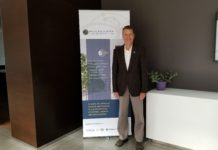Women all over the world are constantly fostering a change within society and here at the University of Waterloo, it’s the research and passion that follows suit. It was with this enthusiastic claim that five prominent professors, Na Young Kim, Aiping Yu, Moira Glerum, Melanie Campbell, and Evelyn Yim, shared their journey and what they love to do everyday in their respective fields at the Women in Nanotechnology seminar Jan. 30. Coming from all walks of life, these women followed their beliefs and had a goal to achieve which allowed them to triumph over any adversity that presented itself on the way.
The seminar began with Kim’s versatile knowledge in engineering, science and quantum computing. She commenced her journey in South Korea, and spent 14 years at Stanford with a sole interest in carbon nanotubes — a phenomenon still unexplored at that time. Working with ideas foreign to society was not exactly easy, which drove Kim’s interest towards condensation in semi-conductors, a developed and optically-proven platform. Presented with numerous opportunities in academia after her studies, Kim desired “to do some industry experience…so [she] went to Apple, 20 minutes down the road.”
She participated in developing the display for iPhone 6 and 6s for 16 months, because it incorporated both her electrical and optical interests. Ultimately, Kim had “some ideas to implement…and the academic platform [would give] infrastructure to make those contributions,” which steered her passion to Canada.
She currently operates the Chemical/Engineering and Optics labs at UW and focuses on a quantum simulator looking at artificial materials that mimic organic material. In her closing statement, Kim claimed that when you have so much knowledge integrated within you, it is essential to always question why something works the way it does; once you have the answer, you can use it to impart that knowledge upon society.
Sharing a similar career path, Yu, who works with the Department of Chemical Engineering and Sustainable Energy, shared her journey next. She completed her PhD on single water carbon nanotubes, worked with GE plastics where she helped design parts for the Boeing 777 Dreamliner, and then took part in developing the framework for Apple products with carbon fibre. At first hesitant to move to Canada from Philadelphia, Yu decided to ultimately follow her dreams and passion to Waterloo. She currently operates the Applied Carbon Nanotech lab with research interest in carbon nanotubes that focus on supercapacitors and the synthesis of graphene.
Her lab is trying to design new ways to “further increase energy density” with supercapacitors wherein one may need to only charge their phone for a few minutes instead of three hours. In addition, her expertise led to publishing a book on supercapacitors. Ultimately, Yu sets a prime example for many young women who love what they do and shows that obstacles will not stop you. Rather, they can encourage to continue following your ambition.
Continuing to set a similar example, Campbell took the stage next, who serves as one of the first members of the nanotechnology group at UW. Campbell completed her Masters in Optics and Biological Applications at University of Waterloo, and then did her PhD in Applied Mathematics in Australia where having a lab provided her with a multidisciplinary background “to go wherever [she] needed to go and find out what [she] needed to find out.”
Initially, her interest in the optics of the eye led to investigation of the question: “when people reach my age, why can’t they see [as well]?” It was this begging question that piqued her interest in eye optics to understand the limitations that caused this behaviour. She incorporated her nanoscience and astronomy background to tackle this problem.
Campbell’s current research focuses on using “the eye as a window to the brain” to take a closer look at the applications of photoexciation of drugs for patients with cone dystrophy (a neurodegenerative condition causing one to lose their colour and central vision). Using her theoretical knowledge, Campbell continues to apply it to real life biological problems faced by many every day.
On that note, Glerum, a biochemist and cell biologist at UW, was the next speaker who had a hint of curiosity during her undergrad on the idea that metabolic processes could give rise to neurodegenerative diseases. Unaware of this fact for a long time, Glerum was fascinated to learn that the inheritance of these diseases could arise from defects in just a single enzyme. After working at Sick Kids Hospital on cell lines and the defective enzymes which caused lactic acid build up in the blood, she finally discovered the affected enzyme, cytochrome oxidase, which caused this problem. Describing “science as a passport”, she studied mitochondrial diseases in Switzerland and New York, hoping to not only find the root of the problem, but also fix it. This led to working with yeast model systems in order to cause a “change in genetics,” and find new diagnostics for this problem. Finally, she stated what kept her going was “fascination, cool, passion … don’t do [something] if your heart is not into [it].”
The Jan. 30 seminar concluded with Yim, the newest member of the Waterloo Institute of Nanotechnology. Born in Hong Kong, she studied chemical engineering at UofT and opened a lab at the National University of Singapore. Finally landing in Waterloo, Yim travelled all over the map to pursue her career. She always had a strong interest in tissue engineering and regenerative medicine, nanotopography, and differentiation of stem cells. She focused on the idea of isolating stem cells from tissues and maintaining regulation of cell behaviours through biomaterials present in the physical environment. She opened her new lab at UW, called the Regenerative Nanomedicine Lab, which studies adult and pluripotent stem cells for regeneration. Despite moving around for her education and work, Yim continued to foster a positive attitude, along with a strong devotion to her work.



























